
The Business of Fashion
Agenda-setting intelligence, analysis and advice for the global fashion community.

Agenda-setting intelligence, analysis and advice for the global fashion community.
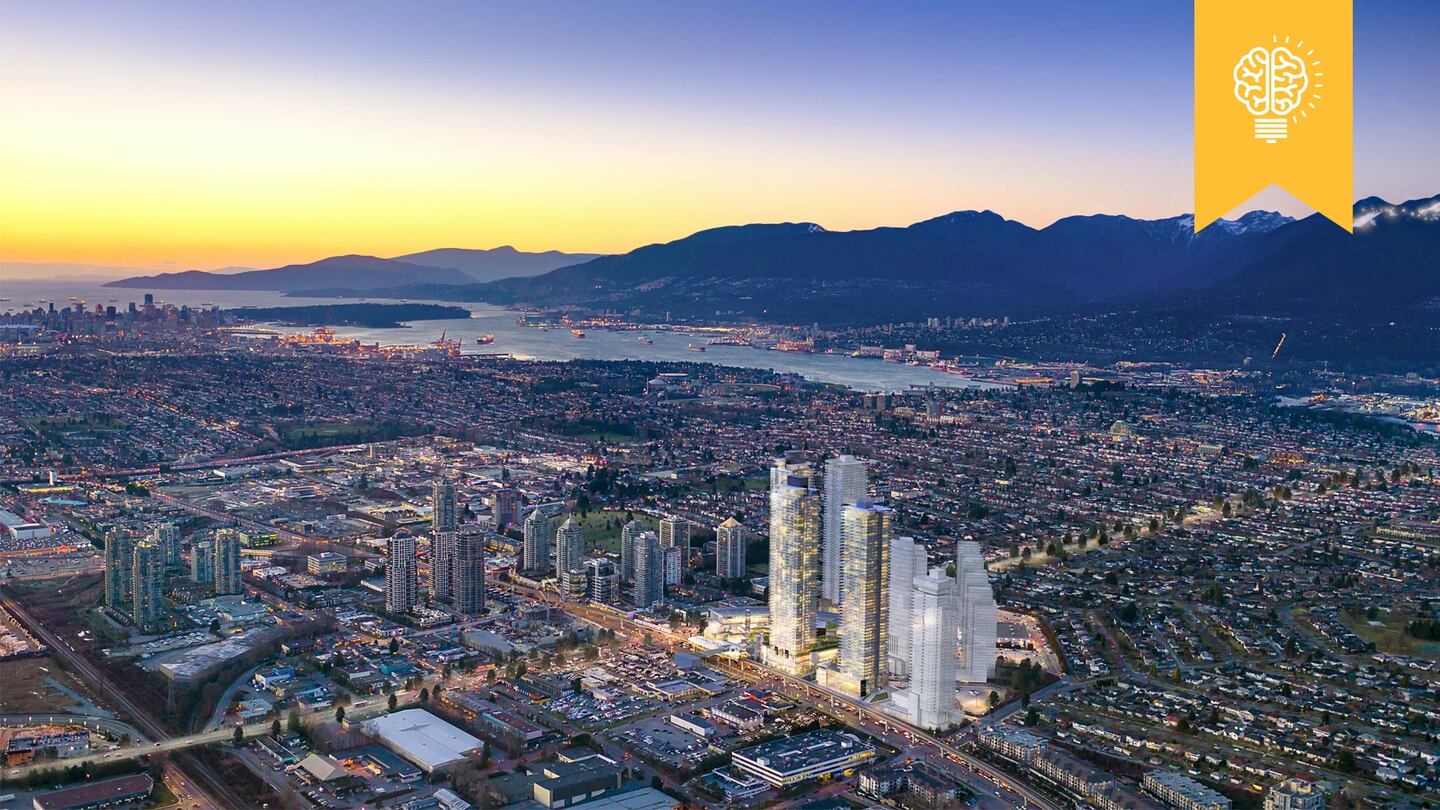
VANCOUVER, Canada — On a residential street in Yaletown, a few blocks from one of the once-industrial neighbourhood's famous waterfront parks, an imposing Art Deco storefront with gilded windows beckons passers-by.
The building has a colourful history: formerly a home furnishings and fabric store, it was built in 1931 as a bookbinding factory. Somewhere along the way, roses were painted on the concrete floor. They are still visible inside the open 22,000-square-foot space, divided by polished aluminum panels, which is now home to a new high-luxury, high-concept boutique named Leisure Center.
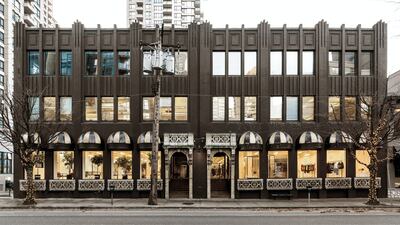
Leisure Center in Vancouver | Source: Courtesy
Designed by architect Olaf Kneer of Casper Mueller Kneer Architects — who counts London's White Cube and Céline as past clients — the boutique's ground floor features Undercover, Yohji Yamamoto, Comme des Garçons, Balenciaga and Loewe, as well as a tonic bar with drinks from New York City's Alchemist's Kitchen, a bookshop in partnership with London's Donlon Books, natural beauty product lines and art installations. Downstairs, giant personal shopping spaces divided by thick felt gallery grey curtains are ready to receive VIP guests.
ADVERTISEMENT
Mason Wu, who owns and operates the Leisure Center with his wife Muyun Li, conceived the store as an “open community” for shoppers to relax and shop. Wu and Li opened their first high-fashion boutique Kokko, originally focused on Japanese designers, in 2010 in Richmond, a suburb of Vancouver where many Chinese immigrants have settled. But he saw a gap in the market for something more conceptual and experiential, with a focus on wellness.
"There is probably no other city in the world that could host such a bold physical space, both in terms of size and content outside of the well-known major cities other than Vancouver," says John Skelton, founder of LN-CC and creative director of the Leisure Center. "The city is a melting pot of east meets west." He says Leisure Center marks a turning point in retail, fusing well-known labels with innovative products and concepts rooted in health and wellness. "Everything from world leading tonics and elixirs, sustainable furniture, natural cosmetics, ethically produced clothing, of course, and the attention to space and sound is as good as you will find anywhere in the world."
“We tried to create something very peaceful,” says Wu. “This concept is a perfect match for the city of Vancouver. [People here] have time, they have money, they have a good life. They are looking for the next step.”
The same could be said for Wu, who was drawn to the city’s unique combination of fresh air, ocean views, mountains, foreigner-friendly environment and quality schools when he started investing in Vancouver real estate fifteen years ago before settling here from Shenzhen with his family.
It’s not an uncommon narrative. Chinese people are the metropolitan area’s largest visible minority, representing 475,000 of the total population of 2.5 million in 2016, according to Statistics Canada. The city’s airport has more direct flights to mainland China than any other in North America or Europe. And the influx has come largely in two stages: first in the late 1990s (before the transfer of sovereignty of Hong Kong from the UK to China in 1997) and then since 2010, when the city hosted the Olympic Games.
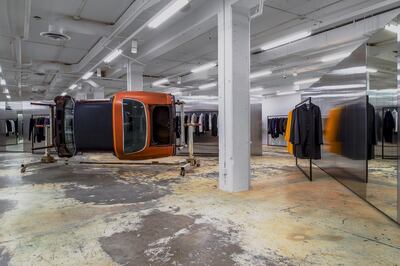
Inside Leisure Center in Vancouver | Source: Courtesy
In the last five years, a wave of particularly wealthy foreigners has entered the country through Canada's immigrant investor programme that granted residency in exchange for $800,000 refundable five-year interest-free loans. It closed to new applicants in 2012 and was replaced with different versions of the programme, which have pumped Chinese millionaires — some seeking refuge from China's anti-corruption crackdowns and a more stable place for their money and families — into Vancouver and Toronto. Many do not live or work in the country full-time. And as a result, Canada has in many ways become a playground for fuerdai, the "rich second generation," who share a penchant for very conspicuous consumption.
According to a report from China’s Hurun Research Institute, Vancouver is the fifth most popular destination for Chinese investment, emigration and property purchasing, topping Toronto. And the Canadian government says Mainland China visitors spend $1 billion a year annually across the country.
ADVERTISEMENT
"I believe the next ten years is a golden time for Vancouver," says Wu. Leisure Center's revenue will be driven by private shopping offered in a membership as well a range of in-store events and programming. Downtown department stores such as Holt Renfrew and the new Nordstrom carry some of the same designers as Leisure Center, but Wu feels that the meditative shopping experience will make it a destination. "I am more focused on the culture we are building here," he says.
Such a conceptual retail proposition, not unlike Dover Street Market, would not be out of place in Paris or London. And while Vancouver still doesn't crack the list of top 25 global cities for luxury — according to Luca Solca, head of luxury goods at BNP Exane Paribas — Leisure Center is indicative of the city's escalating luxury and shopping market, which is growing in sophistication.
“Vancouver is a unique market because it punches above its weight in terms of luxury retail,” says Craig Patterson, retail analyst, director of applied research at the University of Alberta School of Retailing and founder of Retail Insider Media. Toronto is still “the centre of the universe,” in Canada, but “Vancouver is getting superior retail in some instances to Toronto, which is a much bigger and wealthier city, on paper anyway,” he says. “And yes, it’s overwhelmingly a Chinese shopper.”
Vancouver is a unique market because it punches above its weight in terms of luxury retail.
Toronto's shoppers are also more likely to head to Paris or New York to spend. "The wealthy in Vancouver, they live sometimes to shop," says Patterson. "When they are in town, they don't have jobs and they have enough money for whatever [they need]." Indeed, for many fuerdai who are students or casual investors and living off the family fortune, consumption is a full-time job.
Most of Vancouver's shopping is still concentrated downtown. There's Robson Street, a high street equivalent home to more mainstream retailers such as Zara and Vancouver's own Aritzia and Lush. Only a couple blocks away is the downtown's only shopping mall, the Cadillac Fairview Pacific Centre, which includes local department stores Hudson's Bay and Holt Renfrew. Nordstrom's 2015 arrival there is still the most successful store opening in the company's history and has since reportedly become the department store's highest performing location. (Nordstrom does not break out store sales.) Louis Vuitton's boutique downtown at Hotel Vancouver is also said to be its highest performing store in North America, but the company declined to comment.
Nearby, Vancouver's long-standing luxury zone on Alberni Street between Burrard Street and Thurlow Street downtown is booming. Burberry is one of the original luxury brands there, and market sources say the location did close to C$19 million (about $15 million at current exchange) in sales last year, more than twice that of the downtown Toronto location.
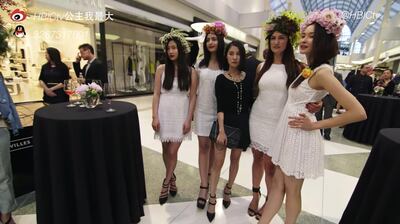
A scene from the reality show the “Ultra Rich Asian Girls of Vancouver" | Source: YouTube
In the last five years, luxury brands have started to overflow the original luxury block and driving out mass market businesses. In 2015, Dior opened its first boutique in the country in the Fairmont Hotel. In 2016, Saint Laurent opened its first free-standing store on Thurlow and Chanel reopened an expanded shop-in-shop boutique on the ground floor of the Holt Renfrew at the Pacific Centre. The same year, Prada arrived on Alberni, occupying a building where one could find a Dollar Tree and 7-Eleven convenience store only three years prior.
ADVERTISEMENT
In 2017, Stefano Ricci opened its first Canadian location next to Trump Tower and Tiffany & Co. renovated its Burrard Street flagship (market sources say the jeweller was reportedly doing more C$40 million, about $31 million at current exchange, a year in sales in under 5,000 square feet of space before the renovation). Jimmy Choo is coming too, as well as what will be Canada's largest Van Cleef & Arpel.
And then there is Gastown, the original city centre that is now the northeast border of downtown and home to a swath of niche, upscale independent boutiques, including Neighbour, Haven and Roden Grey, for the last decade. Larger brands have flocked to the historic cobblestone district as well, including Lululemon (which has a specialised Lab store there), Filson, Cos and, coming next spring, Vancouver-based Herschel Supply Co.’s first North American store.
“This area is the best for menswear in North America if you’re looking for anything contemporary to high end that’s not a flagship store,” says Saager Dilawri, founder of Neighbour, which opened a menswear shop in Gastown in 2011 and a womenswear one down the street four years later.
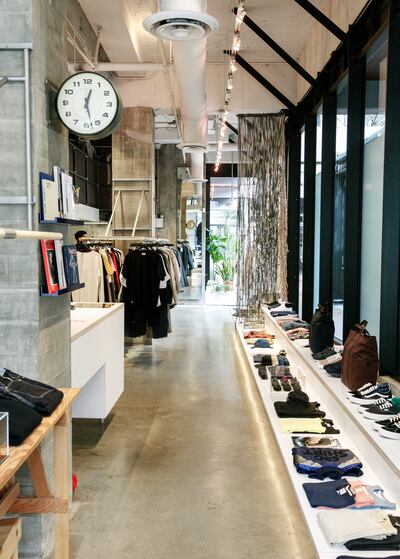
Inside Neighbour in Gastown | Source: Courtesy
International luxury brands may soon have new luxury hubs, however, outside of downtown where mountains and the ocean have constricted population growth.
“One thing that is unique about metro Vancouver is the significant density outside of the main downtown core,” says Darren Kwiatkowski, executive vice president of development and design at Vancouver-based real estate investment, development and management company Shape. “Downtown is at the western end of 2.5 million people.”
Shape is in the race to capitalise on that population by developing a 28-acre mixed-use retail, office/hotel and residential development in Burnaby, one of Metro Vancouver’s municipalities, called The Amazing Brentwood. Valued at over $2 billion and located 10 kilometres from the Pacific Centre, the project will include eleven residential towers, two of which are 63 stories high, that will accommodate over 10,500 residents in over 6,000 homes. It will also include over 250 shops and restaurants and 1.1 million square feet of office and commercial space. It is set to begin opening in spring 2019.
Despite not being built yet, the company has already pre-sold over 1,400 homes, which Kwiatkowski says is a more common practice for Asian investors. “It de-risks the property from a retail perspective,” he adds.
In August, The Amazing Brentwood announced that L Catterton Real Estate — the real estate investment and development arm of L Catterton, whose funds are sponsored by LVMH — had signed on as a strategic development partner. The investment is a “big vote of confidence” in the success of the project,” says Kwiatkowski. “The luxury brands have been expanding and obviously Metro Vancouver is on their radar… Another district hadn't really coalesced in the market,” he says. Ambitious developments are also underway nearby at Lougheed and in Oakridge and Coquitlam.
Shape’s goal for The Amazing Brentwood is to build an integrated city centre that seamlessly mixes residential, retail and offices spaces, boosted by its on-site SkyTrain station. The right mix of retail is also a key, and the company is speaking to luxury department stores and brands such as Rag & Bone, Warby Parker, Theory, Adidas, Maje, Suit Supply and Reigning Champ, among others. It has yet to publicly confirm any retail tenants. “We’re really trying to push and make sure that we're staying true to the best of Vancouver and best of the Pacific Northwest, and trying to put together this really cool collection of brands who are doing something different,” says Katie Bertram, director of leasing at Shape.
Vancouver is not only defined by its unique consumer behaviour, however. The city has also produced more than its fair share of international brands. Aritzia, the vertically-integrated and accessible womenswear brand, was founded in 1984 by chief executive Brian Hill and hit C$667 million ($518 million at current exchange) in revenue in fiscal 2017. Lululemon, the yoga brand turned athletic juggernaut that went public in 2007, brought in $2.3 billion in 2016. There’s also Herschel Supply Co., founded by brothers Lyndon and Jamie Cormack in 2009, and Arc’teryx, Reigning Champ, Lush and more.
“Vancouver has really come out as being an interesting market for lifestyle brands,” says Patterson. “Strong brands that have expansion power.”
Even the market for retail employment has changed radically from when Celeste Burgoyne, Lululemon’s executive vice president of retail in the Americas, moved to Vancouver in 2006. She says there were very few other places to work besides Lululemon. “It’s really great to see how success breeds success,” says Burgoyne, crediting the “very loyal” Canadian consumer. “Vancouver is definitely at the heart of Lululemon,” says Burgoyne. “It’s such an active city… There is a lot of synergy and impact that Vancouver as a city has had on Lululemon from a lifestyle perspective.”
We have a very fashion forward market here in Vancouver, I think people are surprised.
While Vancouver’s homegrown brands address radically different markets, the city’s international consciousness has been a key factor in their success. Vancouver’s international population “has forced us to have a broad representation and allowed us to be successful in lots of different markets,” says Aritzia’s Hill, describing the relationship between the city’s native brands and consumers as synergistic. “We have a very fashion forward market here in Vancouver, I think people are surprised.”
“You grow up with a little quite a foreign aspect in your brain,” says Herschel’s Lyndon Cormack. “People are surprised — ‘How’d you get so global?’ Well, we couldn't survive if we were only here.” That mindset applies beyond Herschel, the brand: Herschel Capital Corp. owns a minority stake in Virginia-based retailer Need Supply Co., acquired luxury retailer Totokaelo in 2016 and, together with Artizia’s Hill, co-owns the 8100 Melrose Avenue shopping complex in Los Angeles.
There is also a Canadian friendliness and practicality at play in its entrepreneurial spirit. “Our goal is to be easy to do business with,” says Cormack. “And it's actually tremendously hard to be easy to do business with.”
While Vancouver was once a “no fashion city” known for Birkenstocks and a more grunge aesthetic, “Canada’s Seattle,” as Patterson describes it, the city has since found its own identity. And the impact on everywhere from downtown to East Van and beyond is still being felt. “It has slowed down a bit, but it still a very strong market,” says Patterson. “Vancouver is on this trajectory of sales growth that I think is unprecedented on the West Coast.”
Editor's Note: A previous version of this article stated that the Leisure Center covers 2,200 square feet. That is incorrect. The store is 22,000 square feet. A previous version of this article also stated that Lululemon went public in 1997. That is incorrect. The company went public in 2007.
Related Articles:
[ Capitalising on Canada’s Fashion MomentOpens in new window ]
[ Canada's Fashion Community Celebrates Homegrown TalentOpens in new window ]
In 2020, like many companies, the $50 billion yoga apparel brand created a new department to improve internal diversity and inclusion, and to create a more equitable playing field for minorities. In interviews with BoF, 14 current and former employees said things only got worse.
For fashion’s private market investors, deal-making may provide less-than-ideal returns and raise questions about the long-term value creation opportunities across parts of the fashion industry, reports The State of Fashion 2024.
A blockbuster public listing should clear the way for other brands to try their luck. That, plus LVMH results and what else to watch for in the coming week.
L Catterton, the private-equity firm with close ties to LVMH and Bernard Arnault that’s preparing to take Birkenstock public, has become an investment giant in the consumer-goods space, with stakes in companies selling everything from fashion to pet food to tacos.